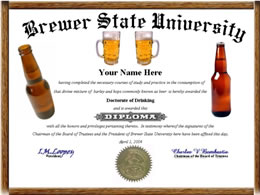 |
Brewing today is more of a science than ever. With advances in the specialty fields of micro-biotics and plant biology, this science is now receiving praise – and the degree programs – from the highest level of academia. The golden age of microbrews we are living in is giving more and more respect around the board to brewmasters, and has created a whole new field of academia – the brew scholar.
With more and more inventive and daring microbrews being created every year, we are seeing the ancient art of brewing given more and more attention. With a better understanding of what happens on the cellular level during each process of brewing – malting, mashing, fermenting, and kegging – efficient short-cuts and better ways of cleaning and sanitizing are becoming apparent. The advent of science of genetic engineering may provide even more efficient ways of fermenting beer as well. Already on the market is the product known as turbo yeast, which ferments quickly and more efficiently than most regular yeast strains. Alcohol fermented by the use of turbo yeast is used primarily as a fuel source or for distillates.
The use of Ethanol as a fuel source is growing rapidly. In Brazil, ethanol production is high, and new “flex” cars are being manufactured, which can run on either Ethanol, Gasoline, or a mixture of the two. U.S. president George W. Bush even visited there in March 7th of 2007, where he signed agreements with Brazilian president about importing alternative alcohol based technology from Brazil to the United States. The rise in value of Ethanol as an easy fuel to turn to has only increased opportunities for the Brew Scholar. After all, alcohol is most easily manufactured through the art and science of fermentation.
Speaking of which, there is a book by brew scholar and professor of brewing technology at U.C. Davis Charles W. Bamforth called Beer: Tap Into the Art and Science of Brewing. This book goes into scientific detail about all aspects of the brewing process, with a mind to a layperson’s understanding of the topics. This is an excellent book for those interested in the details of the process of making beer. This is a good place for a starting home brewer or beer fan to learn more about what they are drinking. Professor Bamforth also gives lectures from time to time, so keep an eye out for his name in your neck of the woods.
One interesting development in the birth of the brew scholar is that many respectable Universities are now offering degrees in brew science. The U.K.’s University at Nottingham has offered since 2006 a master’s course which is open to graduates as well as current brewery employees. Class topics include yeast efficiency, brewery design, and more.
At U.C. Davis, in northern-central California, malting and brewing are taught as part of the bachelor of science degree in Food Science or the master’s degree of science within the Food Science Graduate Group. This is where Professor Bamforth teaches. There are three tiers to the Davis brewing program. First is Introduction to Beer and Brewing, which gets the student familiar with the importance of beer as an international industry, and a basic understanding of how industrial breweries operate. Next is the theoretical class Malting & Brewing Science, which familiarizes the student with all aspects of industrial beer production from growing grains to the point of sale. Thirdly is Practical Malting & Brewing, where the student learns “hands-on” in the brewery and at the lab about analyzing beer and the links of that analysis with production methods.
With the golden age of microbrews going strong, it will be a wonder to see what these new brew scholars can do with beer. We are sure to see more interesting varieties and more efficient beer production thanks to these new degrees. Blue-collar workers finally have something to thank academia for!


